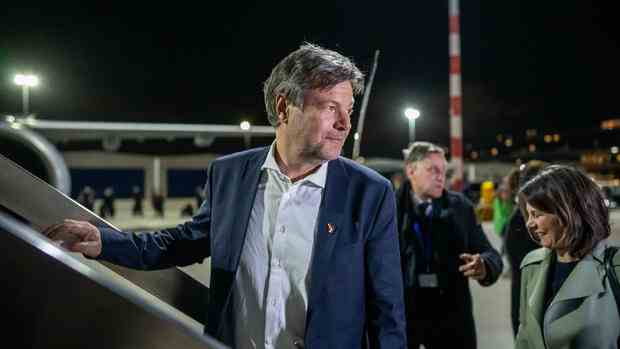The Green base is likely to be disappointed by the results of the coalition committee.
(Photo: dpa)
The result of the coalition committee should cause a lot of trouble for the Greens. Although 80 percent of the additional revenue from a higher truck toll is to be invested in the railways, the party of Federal Economics Minister Robert Habeck did not get much more out of it. Perhaps the agreement that there should also be a solar program for every newly built motorway kilometer. With 144 Autobahn projects, that’s little consolation.
The disappointment of the green base and the political front organizations became apparent shortly after the presentation of the results by the party chairmen of the SPD, FDP and the eco-party. The Greens should not really have been surprised by the result. In recent weeks, resistance to climate and transport policies has grown steadily among the population.
Election defeats in Berlin, Frankfurt and Mainz. Then the referendum on climate protection in the capital did not even reach the necessary quorum. Even with the votes cast, supporters and opponents were almost evenly balanced. Climate protection with a crowbar does not work. At this point, the Greens have been disenchanted.
>>> More on the subject: Traffic light agrees on climate and transport package
No wonder that Robert Habeck was angry at Chancellor Olaf Scholz (SPD) and FDP leader Christian Lindner at the end of the almost 30-hour consultation, who, according to a report, had him in the pliers. Climate policy doesn’t work without the people.
Results of the coalition committee
The traffic light wants to put “considerable funds” into the modernization and expansion of the rail network. At Deutsche Bahn, there is an investment requirement of around 45 billion euros by 2027. This is to be covered, among other things, by revenue from truck tolls on motorways and federal roads. The SPD, Greens and FDP had already agreed on a reform of the truck toll in the coalition agreement, the income from which has so far only gone to trunk roads.
A CO2 surcharge of 200 euros per ton is now to be introduced for the user fee on January 1, 2024. Zero-emission trucks should be exempt from the toll by the end of 2025 and then only have to pay 25 percent of the regular rate. In addition, from 2024, even smaller trucks from 3.5 tons are to be included in the toll obligation. “Handicraft businesses are exempted,” says the decision paper.
For those who travel a lot by train, the 49-euro ticket is to be integrated into the Bahncard 100 at no extra charge, so that it can also be used for local transport in all cities.
If there is really positive news from these talks, then it is the rediscovery of the market economy in climate and transport policy. At least a little way. The Climate Protection Act has always been a bad design. The softening of the so-called sector targets, for example in the transport or building sector, is therefore long overdue. After all, no one knows what innovations there will be in the various areas, where adjustments need to be made and where not. What matters is the total amount of CO2 emissions and not the meticulous bureaucratic compliance with planned economy targets.
The easing of the end for oil and gas heating was therefore only logical. However, where the necessary craftsmen and, so quickly, the heat pumps should come from remains the coalition’s riddle.
The FDP has thus largely prevailed in the negotiations. Apparently there were also proposals from the coalition partners to reduce the commuter allowance or to introduce a national e-car quota. None of that comes. But many will also wonder whether the budget, the strained pension system or a health system that was hospitalized itself was also discussed in the 30 hours.
After this marathon meeting, one would have liked to hear a word about how one intends to counteract the educational misery. The coalition partners should meet again soon and fundamentally consider what progress actually means for them in these areas.
More: “Modernization package for climate protection and planning acceleration” – the traffic light results on 16 pages
